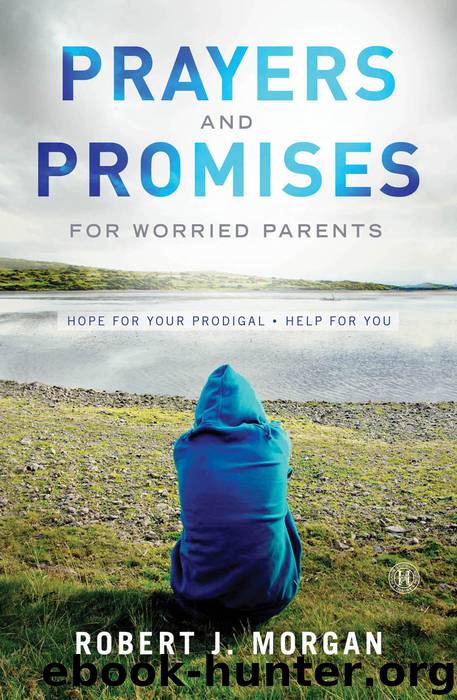Prayers and Promises for Worried Parents by Robert J. Morgan

Author:Robert J. Morgan
Language: eng
Format: epub
Publisher: Howard Books
LEARNING
55
What to Say When You Talk to Yourself
Troubled parents generally love Psalm 103, a cloudless chapter devoted exclusively to counting our blessings and lauding our Lord. It contains nothing but praise. No dismal moods, no requests, no petitions, and no problems. Sometimes we need to breathe such bracing air.
In this psalm, King David used his well-honed technique of talking to himself to speak the truth to his soul about his blessings and benefits in God. In addressing his own soul, he wrote:
Bless the LORD, O my soul;
And all that is within me, bless His holy name!
Bless the LORD, O my soul,
And forget not all His benefits:
Who forgives all your iniquities,
Who heals all your diseases,
Who redeems your life from destruction,
Who crowns you with loving kindness and tender mercies,
Who satisfies your mouth with good things.
—VERSES 1–5
Paraphrasing his words for my own use, I would say: “Self, you’ve been in the dumps long enough—fretting, fearful, fainthearted. It’s time to shake it off. Cheer up! Remember God’s blessings. Don’t forget His benefits toward you. You’ve forgotten His divine presence. You’ve overlooked His promises. Enough of that! Acknowledge the Lord’s blessing, O my soul, and all that is within me—from head to foot—bless His holy name.”
David then takes us on a little tour of the benefits and blessings enjoyed by God’s children.
The first stop is the courthouse, where we remind ourselves that the Lord has declared us “Not guilty!” by virtue of Christ’s sacrifice on Calvary: “Bless the LORD, O my soul . . . who forgives all your iniquities” (verses 2–3). Later, in verses 11–12, he uses a graphic comparison to underscore the immensity of God’s forgiveness, telling us that as far as the east is from the west, so far has He removed our sins from us.
A law student visited me recently. He had fallen into deep and prolonged sin at his fraternity and felt smothered in guilt. His face bore signs of weary despair, and his eyes could hardly look at me. “I’ve confessed and confessed my sins,” he said sadly, “but I can’t imagine God has forgiven me.”
I picked up my book of daily Scripture readings and turned to the page on God’s forgiveness. “Read these verses to me,” I said. He began crying as the Scripture’s powerful truths flushed the hopelessness from his soul. By the end of the verses, he had begun to sense that he could be clean again, that God would forgive to the uttermost.
Next, Psalm 103 takes us to a hospital. It reminds us that God not only forgives all our sins, but also heals all our diseases. I believe this refers to every type of disease—physical, emotional, and spiritual. I don’t accept the assertion that God always heals all our physical diseases in this life—that runs counter to the overall teachings of Scripture and to the actual experiences of Christians. Even the apostle Paul was not healed of his thorn in the flesh, mentioned in 2 Corinthians 12:7–10. Nevertheless, God can give physical healing in answer to prayer, and He often does.
Download
This site does not store any files on its server. We only index and link to content provided by other sites. Please contact the content providers to delete copyright contents if any and email us, we'll remove relevant links or contents immediately.
The Secret Power of Speaking God's Word by Joyce Meyer(3171)
More Language of Letting Go: 366 New Daily Meditations by Melody Beattie(3017)
The Holy Spirit by Billy Graham(2943)
To Light a Sacred Flame by Silver RavenWolf(2813)
Tuesdays With Morrie by Mitch Albom(2754)
The Lost Art of Good Conversation by Sakyong Mipham(2640)
The Traveler's Gift by Andy Andrews(2454)
Kundalini by Gopi Krishna(2180)
A Kingsbury Collection by Karen Kingsbury(2099)
Anxious for Nothing by Max Lucado(1968)
Finding Chika by Mitch Albom(1966)
Angels of God: The Bible, the Church and the Heavenly Hosts by Mike Aquilina(1954)
Angels by Billy Graham(1921)
As a Man Thinketh by James Allen(1897)
Curse Tablets and Binding Spells from the Ancient World by Gager John G.;(1860)
The Yoga of Jesus: Understanding the Hidden Teachings of the Gospels by Paramahansa Yogananda(1847)
Barking to the Choir by Gregory Boyle(1819)
Autobiography of a Yogi (Complete Edition) by Yogananda Paramahansa(1819)
How To Be Born Again by Billy Graham(1775)
